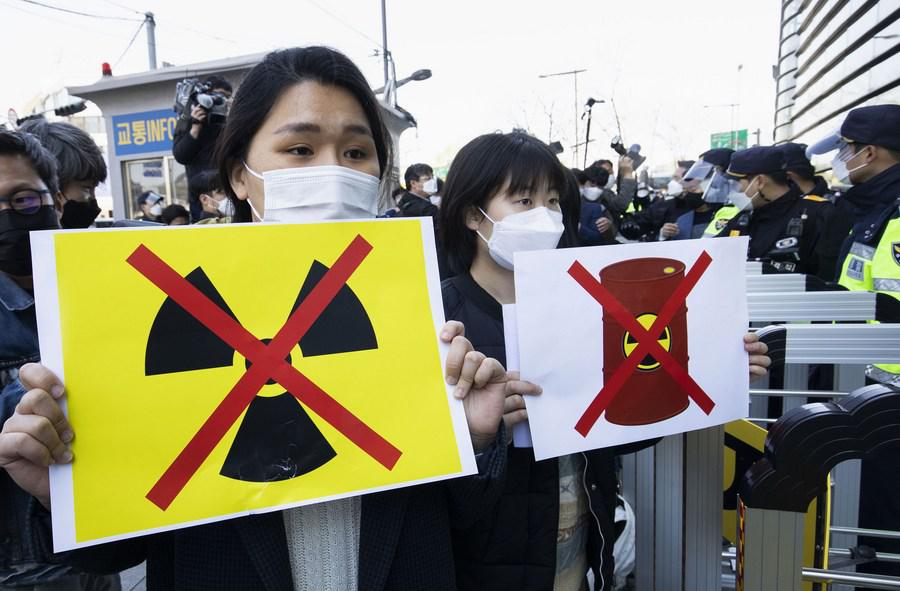China urges Japan's cooperation on nuclear wastewater

People rally to protest against the Japanese government's decision to discharge contaminated radioactive wastewater in Fukushima Prefecture into the sea, in Tokyo, capital of Japan, April 13, 2021.(Xinhua/Du Xiaoyi)
BEIJING, April 15 (Xinhua) -- Chinese Foreign Ministry spokesperson Zhao Lijian Thursday urged Japan to cooperate with relevant countries, including China and the Republic of Korea (ROK), to conduct assessments on Fukushima radioactive wastewater.
Noting at a daily news briefing that the first China-ROK maritime affairs dialogue and cooperation mechanism meeting was convened on Wednesday, Zhao said China and the ROK had urged Japan to prudently handle the issue of Fukushima radioactive wastewater based on full consultation with international institutions and its neighbors and substantive participation of relevant countries and international organizations.
"It is the common position of China and the ROK," Zhao said.
He said it was extremely selfish that Japan wantonly and unilaterally decided to release the nuclear wastewater into the sea and shift the burden and risks onto others in disregard of the safety and interests of the international community, its Asian neighbors in particular.
"To protect the health of their own people and international marine environment, China and the ROK, as Japan's close neighbors and stakeholders, expressed grave concerns and strong dissatisfaction. This is perfectly natural and justified," Zhao said.

People protest against Japan's decision to dump radioactive wastewater from the crippled Fukushima Daiichi nuclear power plant into the Pacific Ocean outside Japanese embassy in Seoul, South Korea, April 14, 2021. (Photo by Xu Ruxi/Xinhua)
Citing unilateral statistics from Japan, the country claimed that the nuclear wastewater is safe. "It is not convincing at all," Zhao said, adding that there are plenty of reports and testimonies that indicated the Tokyo Electric Power Company, which runs the Fukushima Daiichi nuclear power plant, had manipulated data and covered up truth.
"With its poor record, is Japan's data that is lacking in substantive third party participation, assessment and oversight by international agencies and others really reliable?" Zhao asked. He said that according to a German marine scientific research institute, with the world's strongest currents along the coast of Fukushima, radioactive materials could spread to most of the Pacific Ocean within 57 days from the date of discharge, and reach all global oceans in a decade.
"Some Japanese politicians spared no effort to prove that the nuclear wastewater is harmless, then they should use the water for drinking, cooking, laundry and irrigation; guarantee that seafood won't be contaminated; and accept the advice of the International Atomic Energy Agency and set up a technical working group with relevant countries including China and the ROK to make assessment," Zhao said.
While giving thumbs-up to Japan on the one hand, the United States is banning Japanese rice and fish imports on the other, Zhao noted, adding that due to the public health concerns that are associated with radiation and nuclear contamination, the U.S. Food and Drug Administration has increased surveillance of regulated products from Japan.
"How would Japan explain this policy of the United States?" he asked.
Photos
Related Stories
- China urges Japan's cooperation on nuclear wastewater
- China summons Japanese ambassador to lodge representations over Japan's decision to dump nuclear wastewater
- China urges Japan to reconsider decision on nuclear waste disposal: FM spokesperson
- China, ROK urge Japan to prudently handle radioactive wastewater
- China concerned about Japan's decision to release Fukushima water into sea: FM
Copyright © 2021 People's Daily Online. All Rights Reserved.










